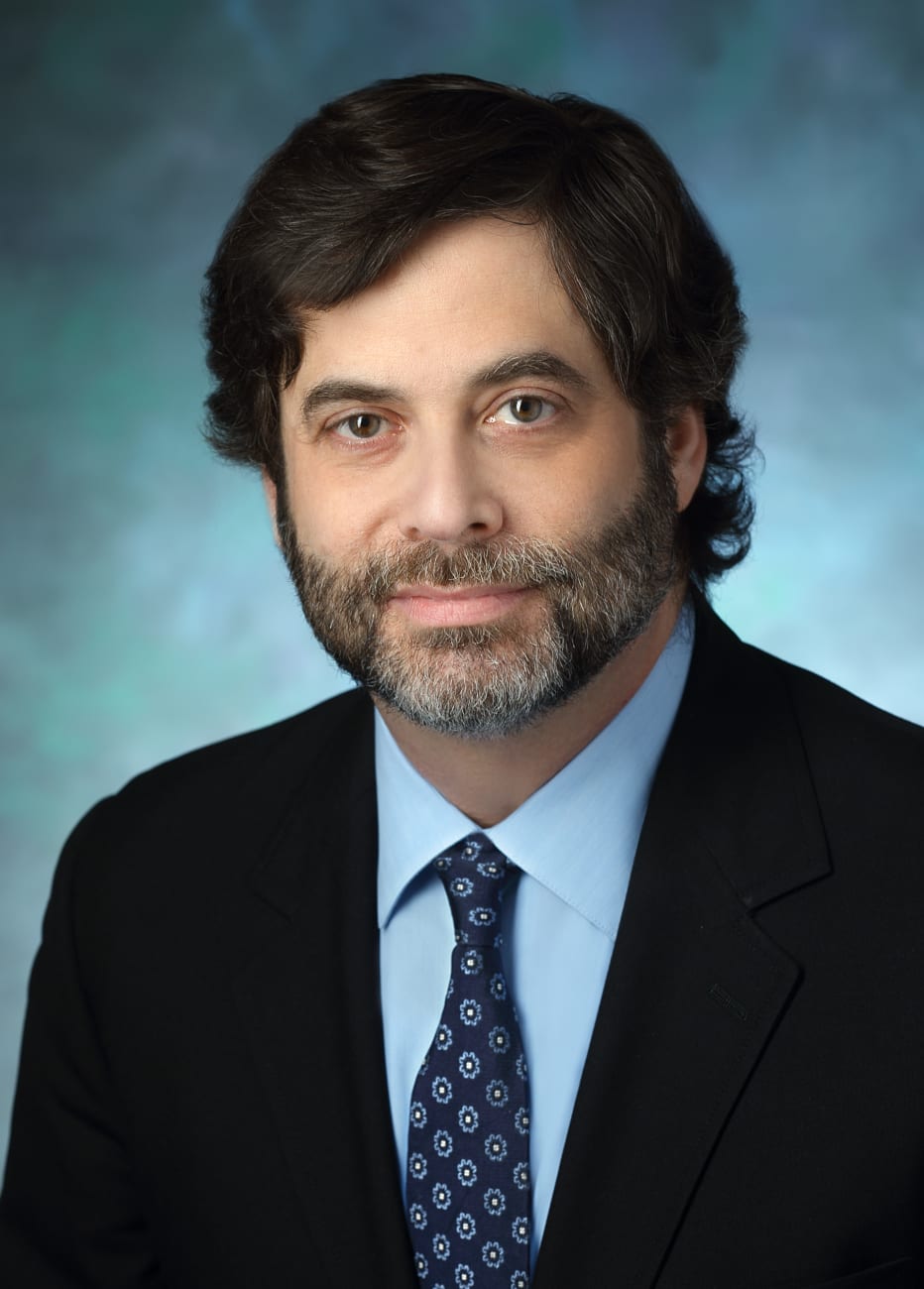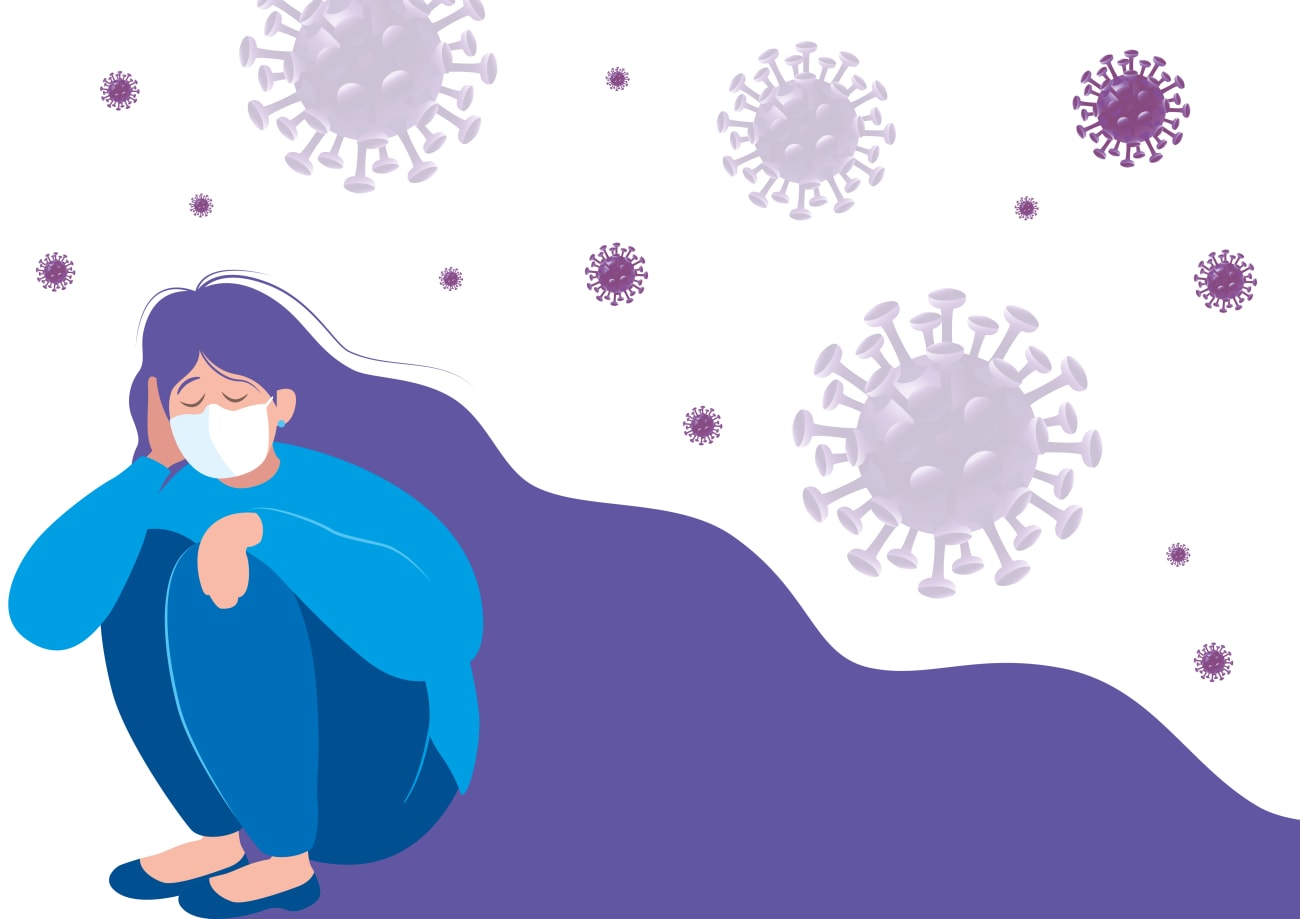
Some 20 years ago, while working in a lab, Johns Hopkins Medicine psychiatrist Adam Kaplin received a piece of advice from neuroscience pioneer Sol Snyder he never forgot: “Go where the action is.” So, when Kaplin, clinical director of the Johns Hopkins Psychiatric Esketamine Clinic and Multiple Sclerosis Psychiatric Clinic, was asked to serve as lead psychiatric consultant for patients on the COVID-19 unit, he responded with an enthusiastic “yes.”
“I felt a need to do whatever I could to help during this pandemic, especially because so many people are on the front lines of care,” says Kaplin. Now, in addition to his preexisting roles, he works with a multidisciplinary team in a virtual clinic called the Post-Acute COVID Team (PACT) to provide mental health care to COVID-19 survivors after they are released from the ICU. Kaplin sees them in their homes, through video visits via Zoom. Many of these patients suffer with depression, delirium and anxiety.
“There’s no question that COVID-19 causes extreme psychological distress,” he says. “But this is new, unfamiliar terrain, especially as the entire world grapples with fears of contracting the deadly disease.”
Kaplin sees as many as five of these patients per day, as they recover at home. Although studies of patients with the disease remain scant, it’s no secret that post-traumatic stress disorder (PTSD) occurs in many of these patients following mechanical ventilation, says Kaplin — as does delirium.
A recent study in China, where the virus was first identified, showed that 15–20% of patients with COVID-19 suffered from depression; 30% had severe anxiety, including PTSD. Previous studies about ICU/mechanical ventilation experiences show long-term negative effects on emotions and cognition. It appears to be especially pronounced in patients with COVID-19, says Kaplin.
“There’s something about this infection that leads these patients to be in an activated state,” he notes. “To treat the disease, they must take heavy-duty drugs, and this level of activation — coupled with the sedatives they need so they don’t rip out their lines — results in a state of delirium, during which they experience elaborate hallucinations and delusions. It messes with these patients.”
Kaplin recalls the case of a middle-aged man who nearly died from COVID-19 and had a vivid apparition, in which he was surrounded by a blockade. Trying desperately to “escape the blockade” during this agitated state, the patient flailed and wrapped himself tighter into his sheets, nearly dislodging his tubes. He was diagnosed with severe depression and PTSD.
Counseling COVID-19 survivors virtually has proved enlightening, says Kaplin. “What’s been most surprising is how similar their experiences are, especially once they return home.”
“On the one hand,” he explains, “while on the unit, these patients feel isolated and depressed because their family and loved ones can’t visit. But once allowed to return home, they all experience a ‘cocoon effect.’ Cloistered in their rooms, they become terrified of getting infected by someone else — though that’s probably not possible — or fear they will inadvertently give the disease to loved ones.”
Some 89% of COVID-19 survivors report having these reactions. During the transition to home life, these patients are eager to speak to Kaplin and to participate in weekly virtual support groups. “It’s been reassuring for them to know this is a shared experience,” he says. Kaplin also recommends reflective journaling to document and help clarify their feelings.
“These patients bring up things they haven’t broached with their families,” says Kaplin. “But if a family member is in the room, I’ll invite them to participate, so we can touch base and offer reassurance. It’s been helpful to observe caregivers’ body language.”
Perhaps the biggest surprise at this time is how much Kaplin can relate: “I feel for these people who are recovering, along with their families. I think everyone in lockdown is experiencing a form of this behavior. We’re all susceptible to this disease. And, with more time together, our idiosyncrasies become magnified.”
Yet Kaplin has learned of unexpected positive experiences among COVID-19 survivors. One woman was contacted by her church to speak about the role of faith in helping her through her ordeal. “This was a person who wasn’t used to public speaking,” he says, “and she told me, ‘I’m doing so well.’”
From a medical standpoint, Kaplin values the weekly interdisciplinary discussions with physicians from neuropsychology, physical medicine and rehabilitation, and pulmonary and critical care. Medical issues arise, such as: May a patient recovering from COVID-19 resume taking his testosterone medication? No, says the pulmonologist, because of a hypercoagulation risk, potentially leading to stroke. “We learn a tremendous amount from each other,” says Kaplin.
How to translate these experiences into managing the care of other patients affected by COVID-19?
“Over time, I’ve found that most COVID-19 survivors really do try to hear and understand what happened to them after they leave,” says Kaplin. “They’re vested; many want to help others. Certainly, as people walk back to their lives, some have a hard time. But a significant number of people do amazingly well.”



